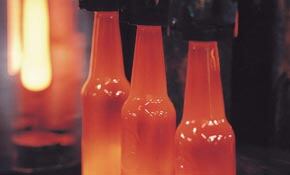The surplus heat from the glass production in Holmegaard, Denmark, is piped from the plant to a tank, which can store 100MWh of heat – equivalent to two days production – from where it is piped into the local district heating plant’s system and on to homes in Fensmark.
Sustainability initiatives
Sharon Crayton, head of marketing (Glass Europe), Ardagh Group, told FoodProductionDaily this isn’t the first project of its type for Ardagh, as it has a similar initiative that has been running since 2010 in Limmared, Sweden.
”Some communities lend themselves better to these types of projects than others,” she said.
”Local circumstances, geography and potential partnerships all have to be taken into account.
”We are constantly reviewing opportunities for sustainability initiatives in other plants and regions.
”What works in one area might not always be feasible in another but there are always opportunities for improvement and we are committed to more sustainable future for all our operations.”
Ardagh Group’s glassworks in Holmegaard produces 160,000 tonnes of container glass each year, equivalent to nearly 700m bottles and jars primarily for the beer spirit, wine, non- alcoholic beverage and food sectors.
Henrik Bonné, plant director, Ardagh Glass Holmegaard, said although the use of significant amounts of recycled glass (cullet) in its furnaces has reduced the amount of energy to power the plant, the glass melting operation still generates a lot of heat that is discharged through the chimney.

Cheaper energy
He added the district will receive a secure supply of cheaper energy because compared to a traditional gas boiler heater it saves at least 3,300 tonnes of CO2 a year.
Bonné claims the money it earns from the 18,000MWh it sells will offset the cost of its investment and it wants to work with SE Blue on further energy improvement projects.
Since 2010, homes, businesses and schools in Limmared, Sweden, receive up to 100% of their hot water and heating via an energy-exchange at a reduced price of approximately 50% (compared with alternative supplier E-ON).
The residents made up of around 5,000 people in the region of Tranemo benefit from the waste heat generated by the furnaces at Ardagh's Limmared facility due to the energy-exchange installation on site.
The heat exchanger also provides all the building heat requirements and hot water to the Limmared facility.
”The first project of this type was at our Lünen plant in Germany,” added Crayton.
”This was installed in the early 90s and we still produce steam from our waste heat for the municipality.”
